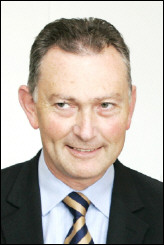|
|
|
|
 |
|
|
Premier League
chief executive
Richard Scudamore |
|
Clubs could be forced to sell their best players under tougher financial controls announced yesterday by Richard Scudamore, the Premier League’s chief executive.
Rigorous annual checks of each club are to be carried out by auditors as an early-warning system designed to prevent overspending. Any club identified as behaving recklessly would then have to take action or face a range of sanctions that could include a ban on all transfer activity.
What Scudamore called a “fire sale” — such as Leeds United had to conduct as they began to fall from the Premier League to League One in four years — would be a very real possibility.
Forced relegation of errant clubs is, however, considered impractical because the Premier League, unlike the Football League, has only one division. As Scudamore said: “Where in the football pyramid would we send them?”
He was responding to questions about the game’s governance posed eight months ago by Andy Burnham, the Sport Secretary. While stopping a long way short of philosophical concurrence with Uefa, whose concern about the debt run up by clubs in England and elsewhere Burnham shares, the Premier League has incorporated all Uefa’s licensing provisions in its own regulations.
Scudamore pointed out that Manchester United, Liverpool, Chelsea, Arsenal and others passed the Uefa test every year as a condition of playing in Europe and added that 18 of the League’s 20 clubs had the licence. But that position could change if Uefa’s present review of licensing criteria proved radical.
“If Uefa ratchet up the rules, we’ll get off the bus,” he said. So he and the European body remain on course for a collision over debt. If, for example, Uefa goes for a form of salary capping or limits on the size of squads (the latter idea has found favour with Michel Platini, the Uefa president, after reports from aides who studied the methods of American sports), the Premier League reserves the right to opt out.
Then Uefa would have to decide whether or not English clubs were eligible for European competition. But a lot of arguing will be done on all sides before that possibility is confronted; Platini expects his organisation’s deliberations to take up to two years.
The Premier League, for its part, believes that the present licensing regulations are onerous enough and that few clubs in England would have an appetite for anything other than what Scudamore argues is already a formidable degree of “self-regulation”. So further tension between Scudamore’s bosses and the Platini camp seems inevitable.
The encouraging aspect is that the Premier League officials are anxious to remain cordial with Burnham. Scudamore called him “a football man to his core . . . a decent, sensible bloke” — and this only days after Burnham had kept up the pressure on football to think radically by asking Premier League clubs to share their European and domestic revenue more evenly.
On financial recklessness, Scudamore is happy to rely on the annual checks on overspending (although he spoke only generally, Portsmouth appeared to overspend in the prelude to their FA Cup triumph last season). “If you overpay for talent, that talent should be dispersed,” Scudamore said. “What happened to Leeds is what should happen to another Leeds, even though it’s tough on the fans.” Should the League detect another case, a “fire sale” of players might follow.
Scudamore also said that the Premier League’s “fit and proper person” test would be tightened, excluding not only those imprisoned for a year or more for any offence, but others who had committed football-related offences such as hooliganism or ticket-touting, even if they were more lightly treated by the courts. He and the Premier League are unlikely, however, to have assuaged the concerns of Burnham or Uefa on the thorny issue of debt, which seems certain to loom large in football’s politics for years.